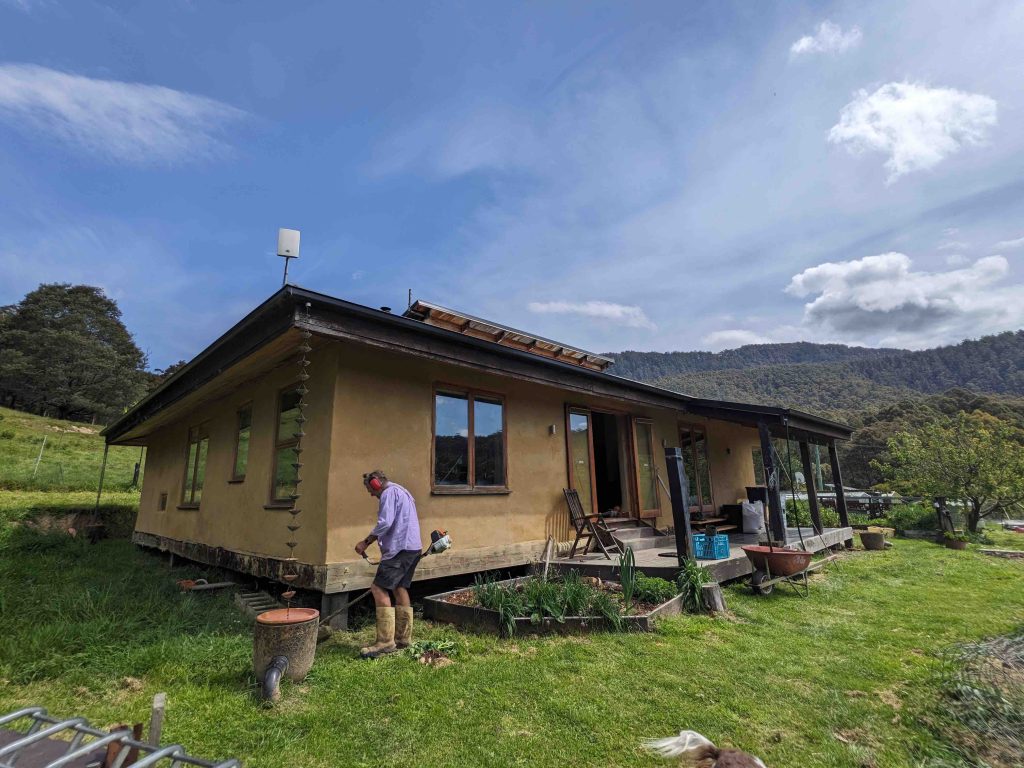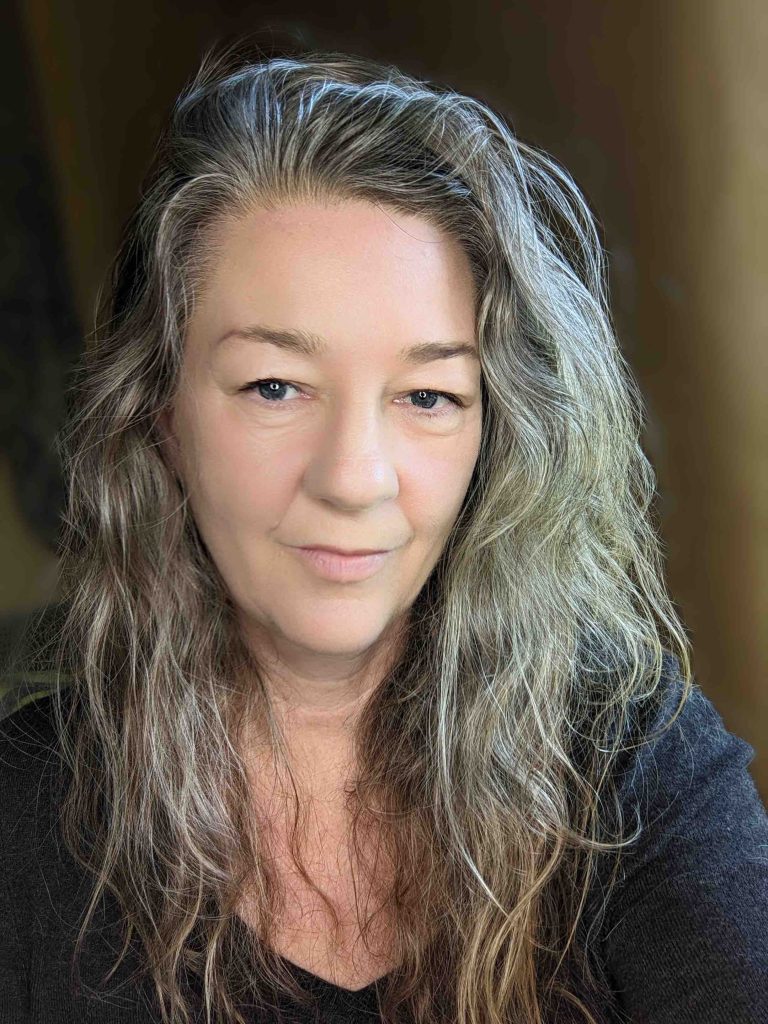I want to save the world. I don’t have any illusions of grandeur, no superpowers, I’m just the same me I’ve always been, and the rules to saving the world are… what are they again?
I’ve been at it for 25 years and I’m happy to admit, I’ve mostly got it wrong. I was relying on technology, renewables, greener consumer options and the idea that individual actions would ‘save the planet.’ After initial resistance, these were strategies ‘green lit’ by capitalism, the window we see and judge the world by.
My attempts to save the world go something like this…
In 2003 I convinced my partner, Trev, to go six months without spending a dollar on food, power, water, transport or consumer goods. Two years’ preparation later, we took our 6-year-old son along for the ride (on the back of a $2 tip shop bike.) We wrote about it in Living the Good Life, How One Family Changed Their World from Their Own Backyard. Our goal was to see how far we could reduce our impact from a suburban block and make voluntary simplicity look sexy. Trev was more convincing.
We were exhaustingly rather than exhaustively interviewed after the book was released. The most commonly asked questions were, but how did you go without chocolate? And what did you wipe your bum with.* I was disappointed by the lack of sexy questions about sustainability. Rather than discuss the 95% reduction of our environmental impact, people only wanted the salacious details on our unusual weight loss scheme. That’s not entirely true, we still hear from people who tell us the book was pivotal in their own efforts to save the world, and that’s gratifying. But the world still needs saving.
The book was filled with facts and I thought, ‘If people just understood…’ but facts rarely change people. Sensing their impotence, we feel compelled to pile on more until it takes but a nudge from people who oppose them to make them fall. They’re not the changemakers we thought they were. But we still rely on them.
Not long after our six-month experiment we moved to Tasmania and hand-built a straw bale house with clay from the dam, locally sourced bales, and 400-year-old celery top pine we’d saved from being burnt as firewood. We made tiles from recycled glass and eschewed concrete, PVC and toxic finishes, while embracing the motto, if there’s a hard way to do something, we’ll find it.
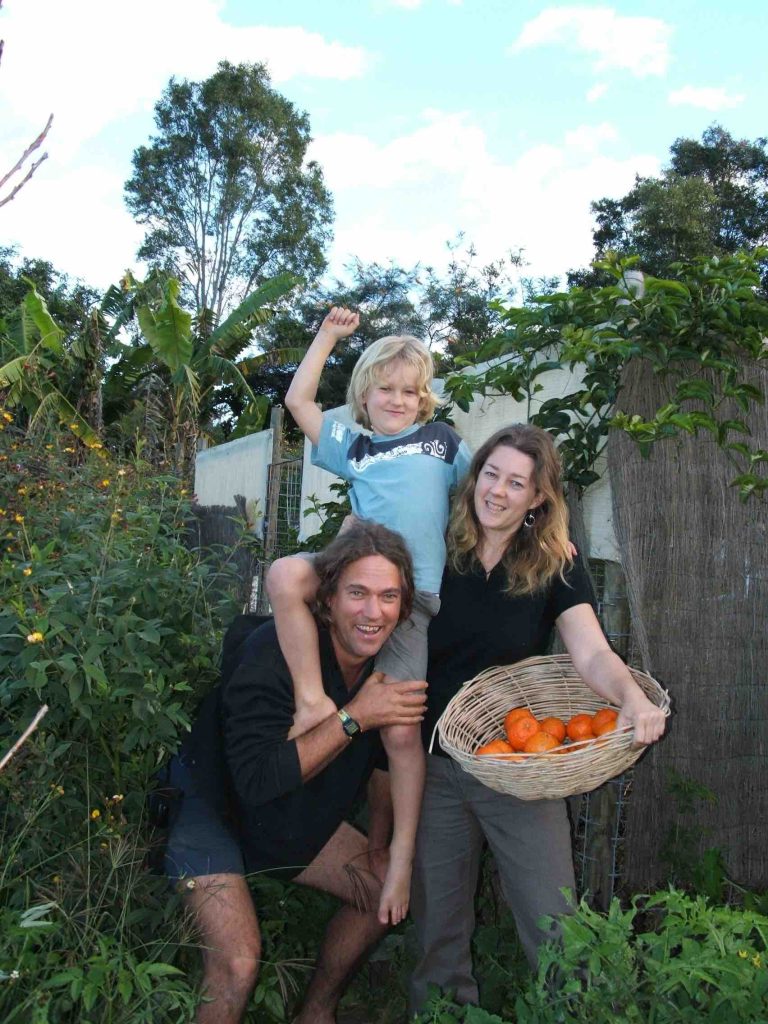
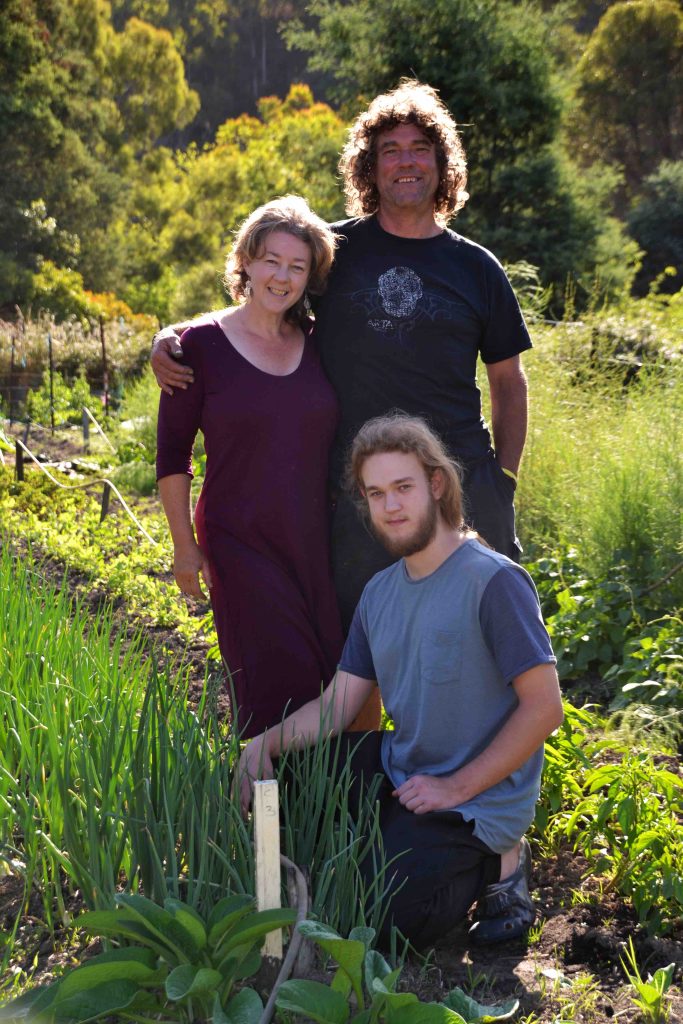
Weekends were spent rendering the house with mud the consistency of firm diarrhoea. During the week I worked to revive a dying community house, converting it into a solar powered community hub running sustainability workshops whenever I could find the funding.
In 2013 local Greens councillor Liz Smith, and I started the Huon Producers’ Network, a not-for-profit that sought to increase food resilience by supporting local farmers to adopt low tech, organic and regenerative practices. The group started a local farmers market and an online ordering system where growers driving home from the market became the delivery system at drop off points throughout the valley.
I left paid employment for market gardening. Between Trev and I we earnt $15,000 the first year – considering the average cost of what we sold was $3 that’s 5000 bunches of carrots. In the second year we more than doubled our income -$35,000. It was unrelenting, 7-days-a-week, hard work.
We transitioned into Seed Freaks, growing rare heirloom vegetables for seed, having decided it was better to teach people to fish than to feed them. Our finances improved, the workload did not. Still, we were determined to contribute meaningfully to helping the community prepare for the civilisation that comes next.
But after 23 years of 7-day weeks, 12-16 hour days, I keeled over and was carted off to hospital; it was another six months before I was diagnosed with heart failure. I don’t look the part: I’m active, not overweight, I don’t drink or smoke. But it turns out those with a superhero complex have their own kryptonite – adrenalin. Stress really can kill. And I hadn’t even made a dent in saving the planet. We sold Seed Freaks and I did my best to recoup some heart function bushwalking and calming the fuck down.
But if what I had been doing didn’t make a difference, what would? The question consumes me.
I’ve been researching for 25 years, collating obscure facts, looking for the chink in our species’ armour. World saving epiphanies don’t come often, but I documented those that did, often waking at 2am to scribble illegibly in notebooks. My cryptic-night writing. But there I was, the beneficiary of enforced down time. I could finally collate my notes and throw myself back into the fray – but in a gentler way. I’d write a book to save the world!
Eat My Shadow, a clifi novel that connects readers to our descendants, came first. Publishers rejected it without reading, telling me, ‘People don’t want to read dystopia. It’s too close to the bone.’ I get it, on a bad day I can smell it coming too. People want romance, bromance and cosy mysteries – escapism is the name of the game. So I fried a few more heart cells and self-published. Readers connect deeply with Finn and Father, who live in a world where civilisation is just a memory. It ties in with our present-day actions, and readers say they have a compulsion to save the Finns and Fathers of the future, and that’s gratifying. But they, like me, don’t know how. Creating impetus is pointless; without a clear path it only encourages people to binge read The Thursday Murder Club series – guilty!
It’s taken many years, but I’ve put over 500 books, research articles, podcasts and movies through my head and my weary heart. Humming along in the background while I wrote Eat My Shadow was, The Quiet Revolution, Debt Free & Working Less, How Our Species Survives. My first draft won an Australian Society of Authors Mentorship. In a deep superhero voice… ‘It’s an audacious plan to save the planet.’
I’ve summarised a couple of main points, first the bad stuff, before hitting you with the good, because that’s how these things roll.
Economic system
We have an economic system that incentivises the destruction of the natural world and the degradation of human lives. Capitalism is growth dependant. 97% of the money circulating in the world is debt. If the economy stops growing we can no longer service that debt and the economy crashes. Every 25ish years we must double the size of the economy to service it. That requires chewing through 1.8 planets, more resources than the planet is able to bioregenerate annually. If by some miracle we maintain growth at 3% a year, in 100 years we’ll have an economy 16 times the size it is now and we’ll be using 12 hypothetical earths.** In 200 years it will be 256 times bigger and we’ll be chewing through 80 earths. An impossibility. Capitalism guarantees extinction. And it’s not just chewing through the planet; we’re weary of servicing it, manipulated to take on debt and busting ourselves to repay it, and others who are excluded from the system are cast aside. There’s a social imperative to end capitalism too.
Technology
We’re technocrats, we have a cognitive bias that Maslow summed up: ‘If the only tool you have is a hammer, it’s tempting to treat everything as if it were a nail.’ We’re now using the hammer (technology) to play whack-a-mole to try to resolve the unintended side effects of previous technologies we’ve come to rely on. And each new technology has repercussions of its own. As a way to resolve problems it has become the primary problem, but it’s a problem that supports consumption – it’s economic ‘fuel’.
Changing the narrative is key to changing the system
According to George Lakoff’s, Don’t Think of an Elephant (Lakoff, 2014) bitching about capitalism or the thing you wish to change, only entrenches it. Rather than reinforcing the dominant paradigm by attacking it or framing everything else in comparison to it, we need to build interest, consensus and joy in its successor. We need viral ideas and ways of thinking that supersede it.
We’re good at inventing systems. I’ve invented Eudaimonia as an example of what we might replace the C word with. It’s an Aristotelian concept that philosopher John Cooper interpreted as ‘flourishing.’ Eudaimonia is designed to leave the world better in 10, 100, 1000 years and beyond. To gauge progress towards the goal is the Eudaimonic Index (EI). It’s beyond the scope of this article to discuss, but economists tell me it’s possible.
Sustainable is a word I once embraced, but now avoid. It’s been overused and has become largely meaningless. We’re given choices: the ‘not so great option’ versus, ‘a slightly better option.’ Which is more ‘sustainable’ and so therefore the correct choice, even if it makes no difference in the long run towards the goal of living within planetary boundaries – we’ll take it. A psychological prop for our flagging hearts and a way to fuel our economic engine, for the wheels cannot stop turning. Is there an alternative?
If Eudaimonia is the system, then Reciprocity is the practice. Give as good as you get is the foundation stone, the driving force for life on earth and the method to restore equilibrium. If doing something takes without commensurate return we’re operating in deficit, continually operating in deficit eventually crashes the planet. I’m deliberately using an economic equation, because that’s how we’ve been braintrained, to ‘calculate’ how we interact with the world. By necessity Reciprocity is a simple concept. It’s the process that enabled our species to arrive in an intact world. Everything and everyone that came before us gave back at the same rate, or more, than they received. For example, birds provide a range of services, including spreading seeds, maintaining sustainable insect and fish populations, being food for other species and recycling nutrients both with their excrement and eventually their bodies.
Reciprocity is akin to permaculture but pushes hard on giving back. Most people understand human to human reciprocity but are mystified when asked about how we might reciprocate with the living world. Because mostly – we don’t.
I ask myself every day, how can our family give back? We’ve composted our poo for decades and fed fruit trees with it. But now we’re gearing up to become Black Soldier Fly breeders, feeding our poo to their larvae, which they love, and the larvae to the chooks, who produce eggs for us, and poo for the garden. Nature doesn’t do waste; everything is food for something else. Her favourite technology is rot.
I’m keen to explore converting community sewage into biogas and snapping up some of those LPG vehicles that’ve become victims of the next wave of ‘sustainable’ transport options, EVs. Doing so would lower methane production and clean up waterways while offsetting the need for coal derived electricity. Don’t pooh-pooh poo mobiles!
It’s a native animal roadkill horror show in the Huon Valley. To reciprocate we’ve fenced off the orchard to allow them access to it for a safe, off-road feed, which has also reduced whippersnipping, our workload and reliance on fossil fuels.
We had a rodent infestation. With reciprocity in mind we built ‘bait stations’- bowls of food at strategic places where the owls can predate feeding rats. We find the remains often enough to know it’s working. But it doesn’t always have to be a ‘tit for tat’ relationship. We’re still taking so much more than we give, even though we plant trees, trap feral cats and sparrows, kill European wasps and remove invasive weeds. I write articles and books about how inspirational people are tackling global issues with reciprocity. Like Bren Smith and 3D Ocean farming, Gabe Brown and Ernst Götsch with regenerative and syntropic agriculture, and Gabriel Gouveia who pays people to grow milkweed and produces insulated clothing while helping to revive the endangered migratory monarch butterfly population. Living and working in reciprocity is possible.
The next stage in my attempt to ‘save the world’ is working on a Reciprocity board game, an attempt to retrain our brains away from Monopoly, the game where success is emptying the bank into your hands and the game only ends when there’s nothing left to take. I’m working with economist Dr Alexis Wadsley and Circular Economy Huon, who are running a workshop for the community to get on board (literally), designing a reciprocity game.
Knowing our collective story, our fraught and dangerous history, how we got ourselves in this predicament is imperative if we are to change the future. I’m of Scottish, English, Irish, French origins – a mongrel, and when I say ‘we’ in the following passages, I’m referring to those of European ancestry. Something clicked when I finally realised, in order to conquer, first we had to be conquered. In order to colonise, first the minds of our peasant ancestors had to be colonised too.
Jason Hickel spoke of the instigation of capitalism in Europe when he wrote, ‘There was no gradual ‘transition,’ as people like to assume, and it certainly wasn’t peaceful. Capitalism rose on the back of organised violence, mass impoverishment, the systematic destruction of self-sufficient subsistence economies’ (Hickel, 2020). He was referring to Europeans.
The psychologist, Chellis Glendinning wrote, ‘Our society is made up of vast numbers of traumatised individuals, and our culture has come into being through a universally traumatising process. The outcome – today’s technological civilisation with its massive psychopathologies and unending ecological disasters – is a collective reflection on the traumatised personality’ (Glendinning, 2007). We too were forced from our not perfect, but natural state, and we too have felt the impacts of colonisation, which anthropologist John Bodley lists as, ‘poverty, longer working hours, and much greater physical exertion, poor health, social disorder, discontent, discrimination, overpopulation, and environmental deterioration’ (Bodley, 2015).
Although Western Europe represents only 8% of the planet’s landmass, from 1492 to 1914 we colonised more than 80% of the world. In the Americas an estimated 56 million indigenous people – 90% of the population – died from disease, slavery, warfare and displacement (Pruitt, 2019) The death toll in Africa has never been adequately estimated. It ranges from 5 million to 50 (Rummel, 2001). The figures are considered conservative. No one bothered counting. In Australia it’s estimated 10,000 Torres Strait Islanders and Indigenous people were killed in over 400 massacres (University of Newcastle, 2022).
Though historians estimate that the number of Aboriginal people killed during colonisation could be as high as 100,000 or more, due to frontier violence and introduced diseases (Harris, 2003; Reynolds, 2022). While the Aboriginal population across the continent itself was estimated to have been between 300,000 and 1 million at the time we Europeans arrived and would decrease dramatically to around 93,000 by Federation in 1901 (Australian Bureau of Statistics, 2002; Madley, 2008).
We (European ancestors) systematically tore people from their alternative utopian visions and forced them to adopt our capitalist ideal. Many of these had been as close-to-as-it-is-possible-to-get utopias until we colonised and/or imposed economic development on them. We’ve rolled out dystopia to the majority of the planet with disastrous results, and congratulated ourselves while doing so.
Many of us from dismantled ancestries now look to indigenous cultures who’ve fought to retain theirs, picking like bower birds through their knowledge, spiritual beliefs and worldviews for ways forward in our own. Having lost our indigeneity, we try to pack our wounds with the ways of others. We call it cultural appropriation. I understand the attraction. We lost our magic and it’s left a hole that drive-thru McDonald’s cannot fill. We envy the sense of ancestral connection some indigenous peoples have managed to retain. But it’s not too late to remember the stories of our ancestors and own them. We were torn from our indigenous lives, as we tore and continue to tear others from theirs. It’s not too late to rip up the triple lane highway and find a pathway back.
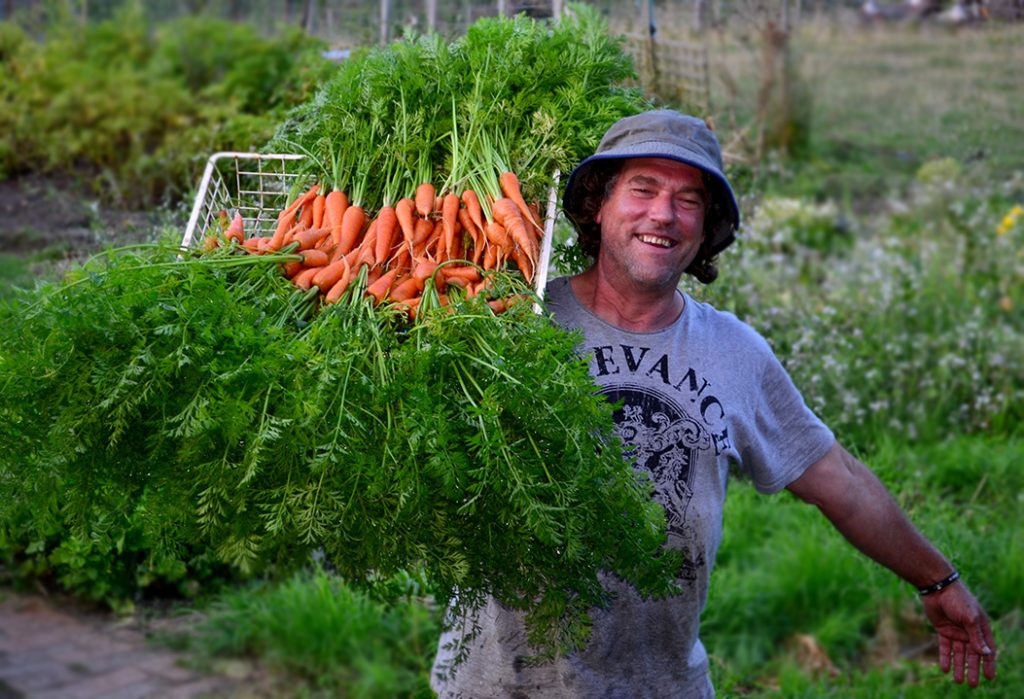
The Good Life
Buen vivir (buuern viv-vere) is a phrase much like Eudaimonia. It has no one distinctive meaning, though collective wellbeing is considered close. It originates from the South American or more precisely Andean countries of Bolivia, Peru and Ecuador. It’s the belief that a good life can only be achieved when you are part of a community, and the community includes the living world. The Ecuadorian Constitution states: ‘We decided to construct a new form of citizen co-existence, in diversity and harmony with nature, to reach el buen vivir, el sumak kawsay (the good life) (Salazar, 2015).
In the Australian Indigenous Ngaanyatjarra (naan ya jera) language. Walykumunu Nyinaratjaku means, to live a good life. A study of Aṉangu and Yarnangu people with a disability concluded that a good life is living on their ancestral lands with their community and taking part in cultural activities (Ngaanyatjarra Pitjantjatjara Yankunytjatjara Women’s Council, 2018).
Winona LaDuke grows organic hemp using low fossil fuel technologies on tribal land in Minnesota. She writes, ‘Our Seven Generations and Seventh Fire prophecies tell us we are in the time when we have a choice between two paths. One path is well worn, scorched and leads to our destruction. The other path is new, green and leads to Mino-Bimaadiziwin (the good life). We must choose to walk the new path’ (LaDuke).
There are many ways to say, a good life, and without knowing them all, I think it’s safe to say they all consider a close connection to the land and community as integral.
We have to stop primarily focusing on what’s wrong with our human made world and be excited about getting it right. We can’t be shy about wanting to save it, even if it is from ourselves. But rather than fight each battle separately, attacking single branches of the only tree that needs toppling, we go for the trunk. The thing that connects and supports them all – our economic system. As Desmond Tutu said, ‘There comes a point where we need to stop just pulling people out of the river. We need to go upstream and find out why they’re falling in.’
You probably saw this coming. No one person will ever save the world. As a goal the only super it is, is super-stupid. But we’ve been brainwashed by the capitalist system to see ourselves as individuals competing against each other. It’s a successful disempowerment strategy. Will saving the living world be easy? No. Is it a quest with a timeline, an end date, a grand finale? No, that’s not how life works. But if we get it right, along the line it will become as self-perpetuating as the damage perpetrated by capitalism, and we will become what we were always meant to be – a together people.
We can either throw mortar shells of fear and self-interest into the future and discover when we get there the potholes and ruins we’ve created, or we can throw trees, clear skies and contented people and find a eudaimonious world when we arrive. The ultimate power we have is choosing our collective future.
*We bartered for cocoa. 6 months without chocolate wasn’t hard even for an addict like me. We grew loofahs, chopped them up and used pieces dipped in water, then dropped into the compost loo – better than toilet paper.
** Doubling the economy is calculated to increase resource use by 60%.
References
Australian Bureau of Statistics. (2002). Year Book Australia, 2002. Catalogue No. 1301.0. Canberra, Australia. Available at: https://www.abs.gov.au/ausstats/abs@.nsf/94713ad45ff1425ca25682000192af2/bfc28642d31c215cca256b350010b3f4!OpenDocument
Bodley, J.H. (2015). Victims of progress. Lanham: Rowman Et Littlefield.
Glendinning, C (2007). My name is Chellis & I’m in Recovery from Western Civilisation. Gabriola Island, Bc, Canada: New Catalyst Books.
Harris, J. (2003). Hiding the bodies: the myth of the humane colonisation of Aboriginal Australia. Aboriginal History, 27, 79-104.
Hickel, J. (2020a). Less is More: Economics For The Age Of Climate Change. Penguin Books.
LaDuke, W. (n.d.). Winona’s Hemp & Heritage Farm. [online] Winona’s Hemp & Heritage Farm. Available at: https://winonashemp.com
Lakoff, G. (2014). Don’t think of an elephant! The all new: know your values and frame the debate. White River Junction: Chelsea Green Publishing.
Madley, B. (2008). From terror to genocide: Britain’s Tasmanian penal colony and Australia’s history wars. Journal of British Studies, 47(1), 77-106.
Ngaanyatjarra Pitjantjatjara Yankunytjatjara Women’s Council (Aboriginal Corporation). (2018). Walykumunu Nyinaratjaku – To Live a Good Life. [online] Available at: http://www.npywc.org.au/wp-content/uploads/Walykumunu-Nyinaratjaku-October-2018.pdf
Reynolds, H. (2022). Forgotten war. NewSouth Books.
Pruitt, Sarah. “How Colonization’s Death Toll May Have Affected Earth’s Climate.” HISTORY, 31 Jan. 2019, www.history.com/news/climate-change-study-colonization-death-farming-collapse
Rummel, RJ. “Commentary: Exemplifying the Horror of European Colonization: Leopold’s Congo.” www.hawaii.edu, 2001 Available at: www.hawaii.edu/powerkills/COMM.7.1.03.HTM#:~:text=John%20Gunther%20(Inside%20Africa%20(1953
Salazar, J.F. (2015). “Buen Vivir: South America’s rethinking of the future we want”. [online] The Conversation. Available at: https://theconversation.com/buen-vivir-south-americas-rethinking-of-the-future-we-want-44507#:~:text=Buen%20Vivir%20draws%20from%20ancestral
University of Newcastle (2022). New evidence reveals Aboriginal massacres committed on extensive scale. [online] The University of Newcastle, Australia. Available at: https://www.newcastle.edu.au/newsroom/featured/new-evidence-reveals-aboriginal-massacres-committed-on-extensive-scale#:~:text=The%20research%20project%2C%20currently%20in
Linda Cockburn lives the life of a Quiet Revolutionary in the Huon Valley, Tasmania. She now writes full time from the family’s straw bale home while experimenting with extending their food production with perennial wheats, naked oats, cool climate chickpeas and breeding new bean and pumpkin varieties. www.instagram/linda_cockburn_author
Image credit. All images by Linda Cockburn.
